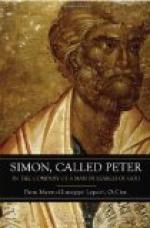Peter, of course, wound in to solemn music with the procession of choir boys and men, and, accorded the honour of a beadle with a silver mace, since he was to preach, was finally installed in a suitably cushioned seat within the altar-rails. He knelt to pray, but it was an effort to formulate anything. He was intensely conscious that morning that a meaning hitherto unfelt and unguessed lay behind his world, and even behind all this pomp and ceremony that he knew so well. Rising, of course, when the senior curate began to intone the opening sentence in a manner which one felt was worthy even of St. John’s, he allowed himself to study his surroundings as never before.
The church had, indeed, an air of great beauty in the morning sunlight. The Renaissance galleries and woodwork, mellowed by time, were dusted by that soft warm glow, and the somewhat sparse congregation, in its magnificently isolated groups, was humanised by it too. The stone of the chancel, flecked with colour, had a quiet dignity, and even the altar, ecclesiastically ludicrous, had a grace of its own. There was to be a celebration after Matins. The historic gold plate was therefore arranged on the retable with something of the effect of show pieces at Mappin and Webb’s. Peter noticed three flagons, and between them two patens of great size. A smaller pair for use stood on the credence-table. The gold chalice and paten, veiled, stood on the altar-table itself, and above them, behind, rose the cross and two vases of hot-house lilies. Suggesting one of the great shields of beaten gold that King Solomon had made for the Temple of Jerusalem, an alms-dish stood on edge, and leant against the retable to the right of the veiled chalice. Peter found himself marvelling at its size, but was recalled to his position when it became necessary to kneel for the Confession.
The service followed its accustomed course, and throughout the whole of it Peter was conscious of his chaotic sermon. He glanced at his notes occasionally, and then put them resolutely away, well aware that they would be all but useless to him. Either he would, at the last, be able to formulate the thoughts that raced through his head, or else he could do no more than occupy the pulpit for the conventional twenty minutes with a conventional sermon. At times he half thought he would follow this easier course, but then the great letters of the newspaper poster seemed to frame themselves before him, and he knew he could not. And so, at last, there was the bowing beadle with the silver mace, and he must set out on the little dignified procession to the great Jacobean pulpit with its velvet cushion at the top.




